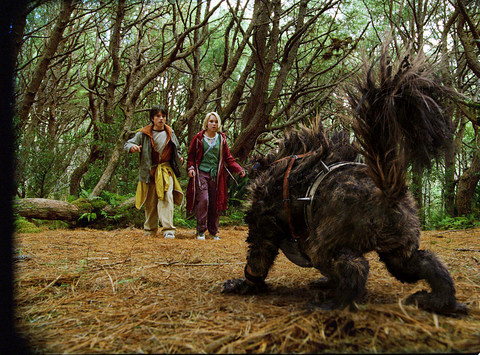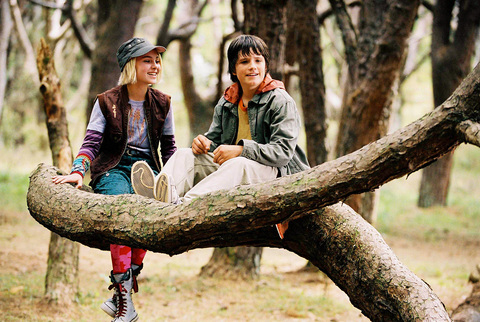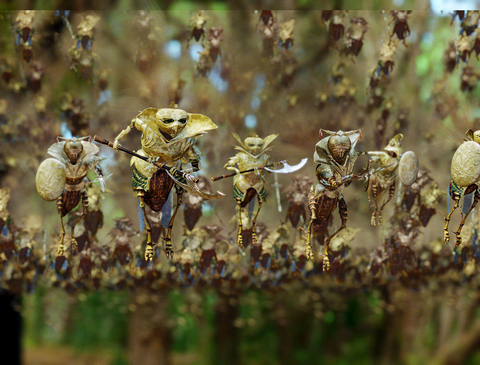Despite an ad campaign suggesting wall-to-wall special effects, Bridge to Terabithia is grounded in reality far more than in fantasy. Adapting Katherine Paterson's award-winning novel, the screenwriters David Paterson (Ms. Paterson's son) and Jeff Stockwell have produced a thoughtful and extremely affecting story of a transformative friendship between two unusually gifted children. The result is a movie whose emotional depth could appeal more to adults than to their offspring.
Jess Aarons (Josh Hutcherson) is a sixth grader with four sisters, financially strained parents (Robert Patrick and Kate Butler) and a talent for drawing. An introverted kid who is regularly picked on by the school jerks, Jess forms a bond with a new student named Leslie (AnnaSophia Robb), a free spirit whose parents, both writers, are fondly neglectful. An attraction between outsiders, their friendship feeds on her words and his pictures; together they create an imaginary kingdom in the woods behind their homes, a world they can control and where their minds can roam free.
Beautifully capturing a time when a bully in school can loom as large as a troll in a nightmare and the encouragement of a teacher can alter the course of a life, Bridge to Terabithia keeps the fantasy in the background to find magic in the everyday. Gabor Csupo, one of the creators of Rugrats, directs this, his first feature, like someone intimate with the pain of being different, allowing each personality more than a single characteristic and reveling in tiny, perfect details: the mending tape hugging a worn pair of sneakers, the way a child detects the tension in a parent's hushed conversation, the inchoate isolation of a lone boy in a house filled with the sounds of women.

PHOTOS COURTEY OF CMC
With strong performances from all the leads, including Zooey Deschanel as a spirited music teacher and little Bailey Madison as Jesse's youngest sister, May Belle, Bridge to Terabithia is able to handle adult topics with nuance and sensitivity. As the emotional landscape darkens, those who haven't read the book may be surprised at the sorrow the filmmakers evoke without ever resorting to shock or sentimentality. In other words, your children may sniffle, but they won't be traumatized.
Consistently smart and delicate as a spider web, Bridge to Terabithia is the kind of children's movie rarely seen nowadays. And at a time when many public schools are being forced to cut music and art from the curriculum, the story's insistence on the healing power of a nurtured imagination is both welcome and essential.




JUNE 30 to JULY 6 After being routed by the Japanese in the bloody battle of Baguashan (八卦山), Hsu Hsiang (徐驤) and a handful of surviving Hakka fighters sped toward Tainan. There, he would meet with Liu Yung-fu (劉永福), leader of the Black Flag Army who had assumed control of the resisting Republic of Formosa after its president and vice-president fled to China. Hsu, who had been fighting non-stop for over two months from Taoyuan to Changhua, was reportedly injured and exhausted. As the story goes, Liu advised that Hsu take shelter in China to recover and regroup, but Hsu steadfastly

Taiwan’s politics is mystifying to many foreign observers. Gosh, that is strange, considering just how logical and straightforward it all is. Let us take a step back and review. Thanks to the Chinese Nationalist Party (KMT) and the Taiwan People’s Party (TPP), starting this year people will once again have Christmas Day off work. In 2002, the Scrooges in the Democratic Progressive Party (DPP) said “bah, humbug” to that. The holiday is not actually Christmas, but rather Constitution Day, celebrating the enactment of the Constitution of the Republic of China (ROC) on December 25, 1947. The DPP and the then pan-blue dominated legislature

Focus Taiwan reported last week that government figures showed unemployment in Taiwan is at historic lows: “The local unemployment rate fell 0.02 percentage points from a month earlier to 3.30 percent in May, the lowest level for the month in 25 years.” Historical lows in joblessness occurred earlier this year as well. The context? Labor shortages. The National Development Council (NDC) expects that Taiwan will be short 400,000 workers by 2030, now just five years away. The depth of the labor crisis is masked by the hundreds of thousands of migrant workers which the economy absolutely depends on, and the

If you’ve lately been feeling that the “Jurassic Park” franchise has jumped an even more ancient creature — the shark — hold off any thoughts of extinction. Judging from the latest entry, there’s still life in this old dino series. Jurassic World Rebirth captures the awe and majesty of the overgrown lizards that’s been lacking for so many of the movies, which became just an endless cat-and-mouse in the dark between scared humans against T-Rexes or raptors. Jurassic World Rebirth lets in the daylight. Credit goes to screenwriter David Koepp, who penned the original Jurassic Park, and director Gareth Edwards, who knows